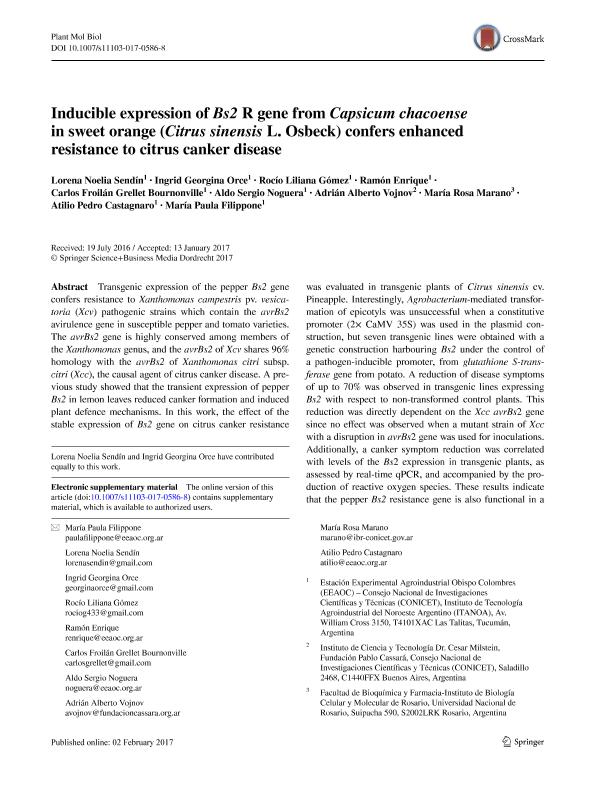Artículo
Inducible expression of Bs2 R gene from Capsicum chacoense in sweet orange (Citrus sinensis L. Osbeck) confers enhanced resistance to citrus canker disease
Sendín, Lorena Noelia ; Orce, Ingrid Georgina
; Orce, Ingrid Georgina ; Gómez, Rocio Liliana
; Gómez, Rocio Liliana ; Enrique, Ramón Atanasio
; Enrique, Ramón Atanasio ; Grellet Bournonville, Carlos Froilan
; Grellet Bournonville, Carlos Froilan ; Noguera, Aldo Sergio; Vojnov, Adrián Alberto
; Noguera, Aldo Sergio; Vojnov, Adrián Alberto ; Marano, María Rosa
; Marano, María Rosa ; Castagnaro, Atilio Pedro
; Castagnaro, Atilio Pedro ; Filippone, María Paula
; Filippone, María Paula
 ; Orce, Ingrid Georgina
; Orce, Ingrid Georgina ; Gómez, Rocio Liliana
; Gómez, Rocio Liliana ; Enrique, Ramón Atanasio
; Enrique, Ramón Atanasio ; Grellet Bournonville, Carlos Froilan
; Grellet Bournonville, Carlos Froilan ; Noguera, Aldo Sergio; Vojnov, Adrián Alberto
; Noguera, Aldo Sergio; Vojnov, Adrián Alberto ; Marano, María Rosa
; Marano, María Rosa ; Castagnaro, Atilio Pedro
; Castagnaro, Atilio Pedro ; Filippone, María Paula
; Filippone, María Paula
Fecha de publicación:
04/2017
Editorial:
Springer
Revista:
Plant Molecular Biology
ISSN:
0167-4412
Idioma:
Inglés
Tipo de recurso:
Artículo publicado
Clasificación temática:
Resumen
Transgenic expression of the pepper Bs2 gene confers resistance to Xanthomonas campestris pv. vesicatoria (Xcv) pathogenic strains which contain the avrBs2 avirulence gene in susceptible pepper and tomato varieties. The avrBs2 gene is highly conserved among members of the Xanthomonas genus, and the avrBs2 of Xcv shares 96% homology with the avrBs2 of Xanthomonas citri subsp. citri (Xcc), the causal agent of citrus canker disease. A previous study showed that the transient expression of pepper Bs2 in lemon leaves reduced canker formation and induced plant defence mechanisms. In this work, the effect of the stable expression of Bs2 gene on citrus canker resistance was evaluated in transgenic plants of Citrus sinensis cv. Pineapple. Interestingly, Agrobacterium-mediated transformation of epicotyls was unsuccessful when a constitutive promoter (2× CaMV 35S) was used in the plasmid construction, but seven transgenic lines were obtained with a genetic construction harbouring Bs2 under the control of a pathogen-inducible promoter, from glutathione S-transferase gene from potato. A reduction of disease symptoms of up to 70% was observed in transgenic lines expressing Bs2 with respect to non-transformed control plants. This reduction was directly dependent on the Xcc avrBs2 gene since no effect was observed when a mutant strain of Xcc with a disruption in avrBs2 gene was used for inoculations. Additionally, a canker symptom reduction was correlated with levels of the Bs2 expression in transgenic plants, as assessed by real-time qPCR, and accompanied by the production of reactive oxygen species. These results indicate that the pepper Bs2 resistance gene is also functional in a family other than the Solanaceae, and could be considered for canker control.
Archivos asociados
Licencia
Identificadores
Colecciones
Articulos(ITA-NOA)
Articulos de INST. DE TECNOLOG. AGROINDUST. DEL NOROESTE ARGENTINO
Articulos de INST. DE TECNOLOG. AGROINDUST. DEL NOROESTE ARGENTINO
Citación
Sendín, Lorena Noelia; Orce, Ingrid Georgina; Gómez, Rocio Liliana; Enrique, Ramón Atanasio; Grellet Bournonville, Carlos Froilan; et al.; Inducible expression of Bs2 R gene from Capsicum chacoense in sweet orange (Citrus sinensis L. Osbeck) confers enhanced resistance to citrus canker disease; Springer; Plant Molecular Biology; 93; 6; 4-2017; 607-621
Compartir
Altmétricas



